-
New York Film Festival 2022

New York Film Festival 60 (Sept. 30-Oct. 15, 2022)
GENERAL FILM FORUM THREAD
Main Slate so far: Opening Night film, Noah Baumbach's Don DeLillo adaptation White Noise, Centerpiece Film, Laura Poitras' Nan Goldin and Sackler family documentary The Beauty and the Bloodshet, closing NIght feature Elegance Bratton's autobiographical feature about Marine basic The Inspection, and Anniversary Film James Gray's autobiographical Armageddon Time.
Film at Lincoln Center announces Noah Baumbach’s White Noise as Opening Night of the 60th New York Film Festival, making its North American premiere at Alice Tully Hall on September 30.
In one of the year’s most gratifyingly ambitious American films, Noah Baumbach (Marriage Story) has adapted Don DeLillo’s epochal postmodern 1985 novel White Noise, long perceived as unfilmable, into a richly layered, entirely unexpected work of contemporary satire. Adam Driver heartily embodies Jack Gladney, an ostentatious “Hitler Studies” professor and father-of-four whose comfortable suburban college town life and marriage to the secretive Babette (Greta Gerwig, perfectly donning a blonde mop of “important hair”) are upended after a horrifying nearby accident creates an airborne toxic event of frightening and unknowable proportions. In a tightrope walk of comedy and horror, Baumbach captures the essence of DeLillo’s cacophonous pop-philosophical nightmare on unbounded consumerism, ecological catastrophe, and the American obsession with death. Impeccably matching DeLillo’s and Baumbach’s similarly percussive form of stylized dialogue, White Noise is wonderfully abrasive and awe-inspiring, a precisely mounted period piece entirely befitting our modern, through-the-looking-glass pandemic reality. A Netflix release.
Links to the reviews:
Armageddon Time (James Gray 2022)
Aftersun (Charlotte Wells 2022)
Alcarrŕs (Carla Simón 2022)
All the Beauty and the Bloodshed (Laura Poitras 2022) CENTERPIECE FILM
All That Breathes (Shaunak Sen 2022)
Bones and All (Luca Guadagnino 2022)
Enys Men (Mark Jenkin 2022)
EO (Jerzy Skolimowski 2022)
Corsage (Marie Kreutzer 2022)
Couple, A/Un couple (Frederick Wiseman 2022)
Descendant (Margaret Brown 2022)
De Humani Corporis Fabrica (Verena Paravel, Lucien Castaing-Taylor 2022)
Decision to Leave (Park Chan-wook 2022)
Eternal Daughter, The (Joanna Hogg 2022)
Inspection, The (Elegance Bratton 2022)
Master Gardener (Paul Schrader 2022)
No Bears (Jafar Panahi 2022)
Novelist's Film, The (Hong Sang-soo 2022)
One Fine Morning/Un beau matin (Mia Hansen-Love 2022)
Pacifiction (Albert Serra 2022)
R.M.N. (Christian Mungiu 2022)
Return to Seoul (Davy Chou 2022)
Saint Omer (Alice Diop 2022)
Scarlet/L'Envol (Pietro Marcello 2022)
She Said (Maria Schrader 2022)
Showing Up (Kelly Reichardt 2022)
Stars at Noon (Claire Denis 2022)
Stonewalling (Huang Ji, Ryunji Otsuka 2022)
TÁR (Todd Field 2022)
Till (Chinonye Chikwu 2022)
Trenque Laquen (Laura Citarella 2022)
Triangle of Sadness (Ruben Östlund 2022)
Unrest ( Cyril Schäublin 2022)
Walk up (Hong Sang-soo 2022)
White Noise (Noah Baumbach 2022) OPENING NIGHT FILM

Last edited by Chris Knipp; 06-20-2024 at 10:42 PM.
-
DECISION TO LEAVE (Park Chan-wook 2022)
PARK CHAN-WOOK: DECISION TO LEAVE (2022)

TANG WEI, PARK HAE-IL IN DECISION TO LEAVE
A police procedural that becomes an erotic cat and mouse game
A RogerEbert.com Cannes review by Ben Kenigsberg provides the essentials of Decision to Leave: "Park, making his first feature since his miniseries adaptation of John LeCarré's "The Little Drummer Girl," is still in a LeCarréan mode, firing plot details at viewers in a clipped editing style at a rapid pace. The film combines a complicated mystery, a love story, and occasional bits of broad comedy to come up with a thriller that feels at once overstuffed and single-minded, derivative and sui generis." This dodgy-ness and complexity can delight, as it does critics like Manohla Dargis and Jessica Kiang. But it can also annoy or confuse those who have trouble following and are jarred by an inconsistency of tone that's almost inevitable in a film that's a mystery thriller, a love story, and a mind-teasing game of shifting jump cuts, flashbacks, and fantasy images.
What's thrilling, though, is the intensity of focus on the central theme of the married detective who falls in love with an attractive female murder suspect and the complexity of the man and woman's relationship, which is all the more erotic and haunting for never becoming sexual. Working in surfaces and depths simultaneously, Park seeks, and achieves, a layered effect. Just as there is an investigation and a love story, there are multiple things going on all the time on different levels.
But the screenplay really does continually and memorably revolve around Jang Hae-joon (Park Hae-il), the chief detective, and Song Seo-rae (Tang Wei of Lust, Caution), the suspect: you walk out of the theater with this duo whirling around in your head, an effect insured by a strikingly tragic, romantic finale on a wild seacoast with fog and spume and roaring waves and rocks as a tide sweeps in and the two principals are present, but lost to each other. It might be incredibly corny if it weren't done so dazzlingly well that it becomes heartbreaking and thrilling. It's one of many things here that reminds you Park, whatever his unevenness or absurdity sometimes, is one of the world's great filmmakers. It is also the case that the two leads play with remarkable conviction and chemistry, with Tang Wei particularly powerful as a memorably chameleonic femme fatale. Did she push her husband off the mountain or is she just very complicated? And she gets more so.
Obviously Park is further than ever from the arresting brutality of the Vengeance trilogy that made him internationally famous, Sympathy for Mr Vengeance, Oldboy and Lady Vengeance (2002, 2003, and 2005). Partly he is in police procedural world, and partly (as more than one reviewer has pointed out) whether he's seen Hitchcock or not, he's in the world of Hitchcock's Vertigo, a man in search of a vanishing, entrancing woman he can never quite track down. There's a lot to process here, and if you want a movie to be understandable the first time through, as I tend to do, you won't be entirely satisfied. But you would also be foolish not to be impressed by such compelling complexity in playing around with a seemingly over-familiar genre.
There was linguistic play in Parks' last feature The Handmaiden (2016 - a long six years ago), where the Japanese occupiers of 1930's Korea speak Japanese and the occupied speak Korean. Here it is established at once that Seo-rae is Chinese and came to Korea as an illegal but was allowed to stay because of a Korean relative who was a a hero in the 1930's war against the Japanese. Her Korean is "insuficient." But it is also interesting, and no doubt for Koreans much subtlety arises from linguistic twists - and meanwhile one of the contemporary phone uses is her way of speaking Chinese into hers when expressing a particularly complex feeling or idea to Hae-joon and having it talk back to him in instant Korean -auto-translation. Smart watches and smart phones are also used as recording devices and oral journals that document and bring back the couple's complexly waxing and waning romance. Numerous reviewers have remarked on how Park makes the smart phone business that confounds many directors contemporary and intriguing.
Sometimes the jump-cuts and switches back and forth in time or from reality to wish made me feel dizzy and helpless. But I'd rather be on a train that's going too fast than one that's going too slow, maybe even be watching a film that's too long than one that's too short. Decision to Leave has a whole second act that starts things all over again, raising the layering effect to a higher level and providing more food for thought. There's no way around the fact that this is a movie for second or more viewings - and, whatever its failings or frustrations, one of the year's best.
Decision to Leave 헤어질 결심 139 mins., debuted at Cannes May 23, 2022, where it won the Best Director award. French theatrical release May 29, AlloCiné press rating 4.0 (80%). Over two dozen other festival showings including the New York Film Festival. US theatrical release Oct. 14, 2022. South Korea's best foreign Oscar entry for 2023. Screened at Albany Twin (West Coast theatrical release) Oct. 28, 2022. Metacitic rating 8̶4̶%̶; now 85%.
Last edited by Chris Knipp; 04-14-2024 at 01:48 PM.
-
TILL (Chinonye Chikwu
CHINONYE CHIKWU: TILL (2022)
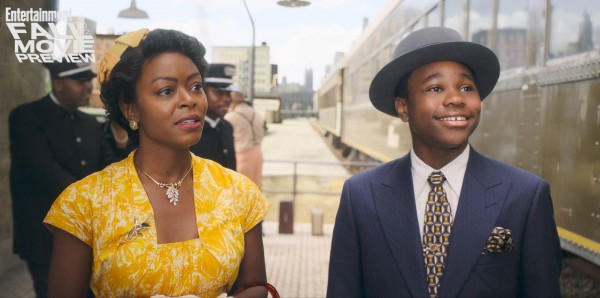
DANIELLE DEADWYLER, JALYN HALL IN TILL
The famous lynching and a memorable performance
As Justin Chang wrote in his review in the Los Angeles Times, the lynching murder of fourteen-year-old African American Emmett Till in Mississippi in 1955 is "one of the cornerstone tragedies of the civil rights movement." He had been seen off by his widowed mother Mamie in Chicago and traveled to the share-cropping Black town of Money, Mississippi to visit cousins in the summertime. Chnonye Chikwu's movie deals with an event already well known through books and films, now finally 70 years later remembered in the 2022 Emmett Till Antilynching Act. The film carefully avoids being a horror story, a political biopic, or a tale of martyrdom while skirting these things, when as Justin Chang says Chikwu "undermines the template of the prestige biographical drama she only appears to be making." The way it does this is through its beauty, its calm, its reverence, its relentlessness, and especially the stunning and powerful performance of of Danielle Deadwyler as Mamie Till-Mobley, Emmett Till's mother, whose story above all this is. This is an extraordinary performance of rare concentration and power. The film is not an easy watch, even though it spares us its grimmest details. One of the best things about it is the way at some points it just pauses to sit for a moment with its feelings, or those of its characters. It allows Deadwyler's performance to hold us. It does, but somewhat at the cost of the film as a whole.
Chikyu showed what she could do in the way of relentlessness in Clemency (ND/NF 2019), her film indictment of American capital punishment through the point of view of a Black woman prison warden. That Sundance-prize-winning film also showed the writer-director's skill working with actors even as I called it "one long, loud wail that might be more ennobling and memorable as an aria." Clemency struggled in darkness. Till walks out into the light. The central event isn't the boy's murder: it's Mamie, his mother's, insistence that his mutilated body, with his unrecognizable face, be brought home to her in Chicago and then displayed in an open casket for mourners, press, and public alike to see - out in the light. The scene where Mamie privately examines her son's body Justin Chang describes as a "long, artful and awful sequence" whose "strange mix of the tactful and the unsparing" is one that "exemplifies the sheer difficulty of the challenge Chukwu has set herself" in telling this story.
We cannot know exactly what happened that day in the little Black-catering local grocery store where Emmett till encountered the proprietor Carolyn Bryant (Haley Bennett, whom Justin Chang calls "suitably loathsome") and may have complimented her as looking like a movie star and later outside whistled at her in admiration. But we glimpse this so that later at the trail of her two "brutish" husband and brother-and-law who came (with three Black employees) to take Emmett away and lynched him we know that Bryant's accusation of the boy's physically assaulting her is a baldfaced lie. Because this is Mamie's story and also to avoid further martyrizing the African American public, Chukwu has made the decision not to show the lynching of Emmett itself, only the rushing in, the menacing of the relatives, the taking away of the victim, and then, in the distance his muffled screams.
The body of Emmett is important too, and the face, when it's brought to Chicago - when you consider it, a remarkable event, under the circumstances and since it was found in a river - after it is left with Mamie to look at. Here the camera gradually gives us a view of a limb and then the face, but only briefly. More important is the speech of Mamie when she goes south and testifies in the trial - also remarkable, if ultimately meaningless - and describes the intimacy with which a mother knows her son.
Likewise as Chang pointed out, biographical dramas depend or some audience familiarity with their "real-life subject." And so we don't have to be told though Mamie carefully schooled her son that in Money, Mississippi, Emmett would have to be extremely careful how he behaved toward any white person and be able to bow down on the ground to apologize in abject humility if he offended in any way. But Emmett was "an infectiously high-spirited kid," indeed, " the most gregarious of jokesters" (and one might add, as big for his age), further excited and distracted by being on holiday in a new place. He did not know yet that he had entered into Hell: the Jim Crow-era South.
But as important as the southern sequences are, including the one of the courtroom, it's what happens in Chicago that counts in this film, away from Hell, in the land of hope extended. Chang comments on the beauty of the images, drenched with color and light, and argues that the "ravishing tenderness of Chukwu’s gaze" mounts "a visual argument," saying that before the tragedy ad "even afterward" "Mamie’s home courses and sometimes overflows with love and life." And this is expressed in the "treasurable" few scenes of Whoppi Goldberg as Mamie's mother Alma and in Jalyn Hall's "boisterous" performance as Emmett. This glow of the gaze combines with the stillness and lingering at moments, especially on Danielle Deadwyler's face at key moments when the actress at once projects and embodies the profound emotions Mamie is going through.
Why should you go to see this film? Say rather why you should not. People are still (perhaps forever?)staying away from movies in droves, and one can't urge you to endanger yourself. But it is important and essential to experience that "gaze" through our gaze, to see without looking away and - through someone was looking at his phone periodically all through, this compulsion ever-stronger - the way that happens is in a movie theater, with nothing between you and the big screen. Do you remember when you did that? When you could not look away for two hours? This is the Chinonye Chukwu experience. And you go through it here for two reasons: to experience racism and the reply - Mamie's courage and defiance and her turn from lonely mourning to empowered NAACP activism; and to witness the extraordinary performance of Danielle Deadwyler. But we know from our earliest experience, all that makes a movie riveting doesn't necessarily make it good, and there are elements in Till and perhaps in Chikwu's work, that lack a sense of the big picture and drift toward conventionality. The performance, and the radiant beauty amid the squalor remain, and should be seen as the NYFF audience first saw it, in a great movie hall, with wonderful sound and an attentive audience, keeping still.
Till, 130 mns., debuted at the New York Film Festival Oct. 1, 2022 and showed at a few other festivals including Rio, Mill Valley, the Hamptons, and London (BFI). Limited US theatrical release Oct. 14 and wider release Oct. 28, 2022. Metacritic rating: 78%. Screened for this review at the Grand Lake Theatre, Oakland, California Oct. 30.
-
TRIANGLE OF SADNESS (Ruben Östlund 2022)
RUBEN ÖSTLULND: TRIANGLE OF SADNESS (2022)

CHARLBI DEAN AND HARRIS DICKINSON IN TRIANGLE OF SADNESS
Östlund shocks and entertains but his points are scattershot - for a second time
Ruben Östlund's new film Triangle of Sadness is painfully entertaining and wickedly funny. It holds your attention from show-offy opening to cliff-hanger finale. Yet it is annoying and disappointing in many ways. Though a wickedly funny entertainment, if's also heavy-handed, obvious and full of irrelevancies, and doesn't do justice to its premise. The theme comes from J. M. Barrie's 1902 play The Admirable Crichton (adapted as a film in 1957) about role reversals when a group of posh passengers is shipwrecked and marooned on a desert island, and a social inferior takes over because he is a skillful outdoorsman. A few shards of the original play and film remain. The issue of social justice is very relevant, because we live in a time of a surfeit of the super-rich and an erosion of social values. Östlund knows how to make us uncomfortable, as he showed with racial discomfort in his 2011 Play, and the futile attempt to escape a moment of cowardice in his 2014 Force Majeure. He likes to look at society through the wrong end of the telescope. His methods are scattershot here, though, as they were in his 2017 The Square, where the director abandons the intense focus of Play and Force Majeure and focuses on at least three different plots. That's more or less what happens here.
Perhaps seeking relevance, or riffing obscurely off a romance in the original play, Östlund focuses first of all on two young super-models, which allows for ironic focus on sexual roles. Yaha (Charlbi Dean, who died before the film came out) makes three times as much as her boyfriend Carl (Harris Dickinson). Their opening section is an amusing, uncomfortable panel from another film, in which, after a sequence showing off Carl toyed with by fashion industry managers ("triangle of sadness" comes from an unfavorable. critique of his face), the pair argue over money at length. Women's liberation obviously means little to their relationship. Carl is the disadvantaged one, and it's painful that he wants to be "friends" or "equals," since she can afford the posh restaurants much better than he can. And yet still she plays the woman's game, this time, anyway, of leaving the check for him to pick up. This sequence is rather good.
The segue (this film is in chapters) is that to appease Carl perhaps, Yaya, who is an "influencer" - which means constantly photographing herself with her phone, takes Carl along on a free trip she's been offered on a luxury yacht. Later, we will realize that Abagail (Dolly De Leon), the yacht cleaning lady who's going to become "captain" on the island through her survival skills, notices the desirability of Carl, whom on the island she calls "Cutie-Pie." Even on the island, when they have nothing, Abagail's taking over Carl leads to lots of painful discussion between him and Yaya: their neurotic relationship survives in extremis.. In a cast of characters none of whom is at all appealing Dickinson somehow seems sympathetic. Tall and thin, with his perfect pecs and abs, he has long arms that reach out all the time and he seems like a sleek, wide-eyed human praying mantis, eager and well-meaning.
The social aspect is updated, necessarily. The vessel that sinks is a $250 million luxury yacht. Though there are new-rich types - a clueless old couple super-rich from dealing arms; a boorish jokey Russian billionaire (Zlatko Buric)who delights in declaring that his fortune comes from "shit," and a bore whose wealth is from stultifyingLY uninteresting Silicon Valley product. The yacht gets waylaid by a heavy storm and sunk by hand grenades shot off by local terrorists (Östlund isn't taking any chances). Unfortunately the desert island phase of the film is the most lame.
Apart from the coming reversal of fortune, the yacht may remind you of David Foster Wallace's piece "A Supposedly Fun Thing I'll Never Do Again," which explained how a cruise where a passenger's every need is taken care of can turn into velvet-fingered torture. The service crew is introduced in a scene where their nervous supervisor Paula (Vicki Berlin) gives a pep-talk in which the "client is king" rule is ramped up to the max. Here, crew must absolutely never say no to a passenger. Thus a far-fetched sequence where one nutty rich lady insists a staff member join her in the sauna, then revises that to command the whole crew to don swimming gear and go down the sea-slide for a swim in the ocean.
The Captain (Woody Harrelson) is a drunkard holed up in his cabin and Paula has great difficulty getting him out and in uniform for the evening of the "Captain's dinner." This is where all hell lets loose after the seas turn so stormy passengers flee to their staterooms, but not before there is way more projectile vomiting than even the most heavy-handed get-the-rich program made necessary. A character in Barrie's original who's addicted to aphorisms seems to explain how the Captain, in front of a microphone broadcasting throughout the ship, exchanges sayings about socialism and communism with the Russian shit dealer; both have sympathies with both, it seems.
This is a ridiculous and over-the-top sequence, but it's undeniably compelling in its threatening, energetic chaos. The trouble is that the following, island, sequence is such an anti-climax, starting with a greatly reduced cast for it.
What can we make of this movie? As with The Square, Östlund seems a little too pleased with himself, convinced because his film contains topically relevant material and shock value it will gain accolades despite lack of formal coherence. And he succeeds, since awards do come in. But the critics were far less pleased with The Square than with Play and Force Majeure, and still less pleased with Triangle of Sadness than with The Square. Maybe Östlund, who has plenty of talent, should start listening to this critical consensus and make less flashy but better movies.
Triangle of Sadness (French title 'Sans filtre'), 147 mins., debuted at Cannes, where it won the Palme d'Or and a CSI technician prize. It was included in other prestigious international festivals, including Sydney, Sarajevo, Toronto, Zurich, and New York NYFF Main Slate), among others. Screened for this review with two other viewers for the opening noon show at AMC Bay Street, Emeryville Oct. 29, 2022. Metacritic rating: 63%.
-
Tár
TODD FIELD: TÁR (2022)
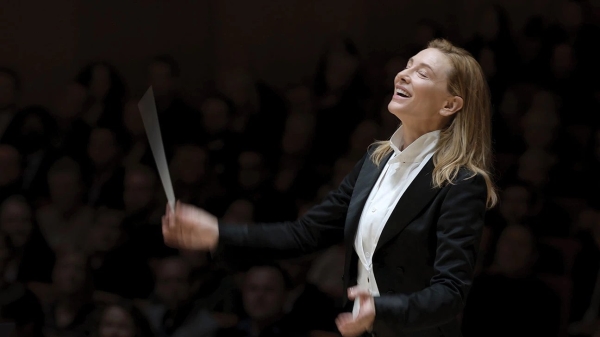
CATE BLANCHETT IN TÁR
A shimmering portrait of brilliance, cruelty, and downfall
This is a story of power and prestige and their apparent downfall focused on a conductor, a woman, and a lesbian, a greater rarity* at the pinnacle of international classical music who pushes too hard and maneuvers too cruelly, and has awful things happen to her. TÁR is a remarkable picture and signals to us the ascendency of its 'maker,' Todd Field, and his star, Cate Blanchett. We already knew Cate to be great, but here she gets an exceptional chance to prove it in in a rich and demanding role for which she learned to conduct - and convincingly, with originality, to rehearse - a symphony orchestra, to speak German, and to play, not just the piano, but Bach's Well-Tempered Clavier, no less, mimicking the style of Glenn Gould for a moment while devestatingly dressing down a young student at Julliard who has let political correctness and his personal identity sweep away the western canon.
This is a worthwhile argument indeed. Surely we cannot allow Bach to be treated as icky because he was a cis-male white European man and sired 20 children. Putting the defense in the mouth of one so flawed as Lydia Tár leaves it properly ambiguous: we can't decide these things right now; there's still a lot of hashing-out to do. What authority Lydia has: she is the conductor of the Berlin Philharmonic, behind her Leon Fürtwangler, Herbert von Karajan, and Claudio Abbado. But her dressing down of the attractive young mixed race Julliard conducting student, Max (Zethphan D. Smith-Gneist), winds up with a jokey racial slur someone happens to break the rules of the meeting and film. And this is only the beginning - and not even, because before that there has been an interview appearance by The New Yorker's Adam Gopnik as himself, retailing all Lydia's accomplishments.
What Field has done in the sixteen years since he directed a film is uncertain, apparently nothing, but he has grown exponentially as a director. In the Bedroom (2001) was already an outstanding film, Little Children (2006) noteworthy enough for Telluride, Toronto, and New York; but TÁR takes on challenges of a higher magnitude, the complex international portrait of a sophisticated profession, one that is riveting, suspenseful and slyly malicious, and a personality that defies analysis. This is both an admiring portrait of the classical music world and cruel satire, the study of a brilliant artist and an anatomy of madness. Its maniacal extreme takes it into the growing world of high class horror. And yet Field avoids the over-the-top-ness of something like Black Swan. The music is still there. There's a respect for the complex juggling involved in conducting, administration, recording, promotion, and admiration and love for Mahler's Fifth and Elgar's Cello Concerto, the two works concentrated on.
There's a galaxy of satellites or "transactional" key relations around Lydia, starting with her lover and wife Sharon (the great German Actress Nina Hoss), her abused schoolgirl daughter Petra (Mila Bogojevic), her selfless assistant Francesca (Noémie Merlant). Then there are those who come and go, her assistant conductor Sebastian (actor and musician Allan Corduner) who she is "rotating out," a pretty young Russian cellist Olga (cellist and actress Sophie Kauer) who's being brought in. And there is a suicide. But she's alone, as is clear in a dangerous visit to a scary place, and a return to nameless American family where she watches an old videotape of a Leonard Bernstein Young People's Concert where the maestro, a mentor, affirms the sweet emotionality of classical music.
It isn't just a portrait of grand personal decline but also a remarkably complex picture of international celebrity music-making. The sequences of Lydia with a self-portrait book that's being published, working on a recording vs. a live performance, choosing the precise lighting and pose for the new Deutsche Grammophon album cover, these and so much mmore help fill out the details of such a complex role as major orchestra conductor. But it's the committees and boards she must meet with when she has fallen from grace that are greatest challenge. Field opts also for a complex finale. He does not go into the details that would be generated by grotesque faux pas in a "cancel culture," social media world. Instead he shows Lydia soldiering on, still conducting a symphony orchestra in an unidentified Asian country for a Monster Hunter concert. What does that even mean?
As here, and throughout the whole film, Todd Field opts for complicated, sometimes puzzling details notable for their originality and specificity - and not for the kind of flashy style the material would lead you to expect. There is much material in TÁR for thought and investigation. It's the kind of movie you want to discuss and see again.
*What will Marin Alsop think of it?
TÁR, 158 mins., debuted at Venice Sept. 1, 2022, showing also at Telluride, New York, Mill Valley, and a few other festivals. Limited theatrical release started Oct. 8. Screened for this review at AMC Kabuki 8, San Francisco, Oct. 16, 2022. Metacritic rating: 90%.
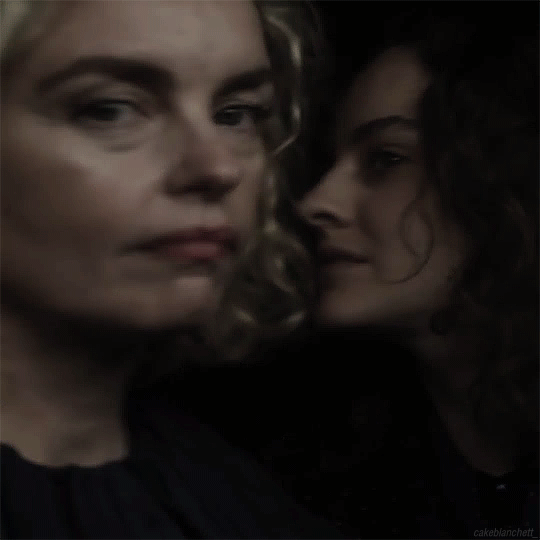
-
ARMAGEDDON TIME (James Gray 2022)
JAMES GRAY: ARMAGEDDON TIME (2022) -NYFF
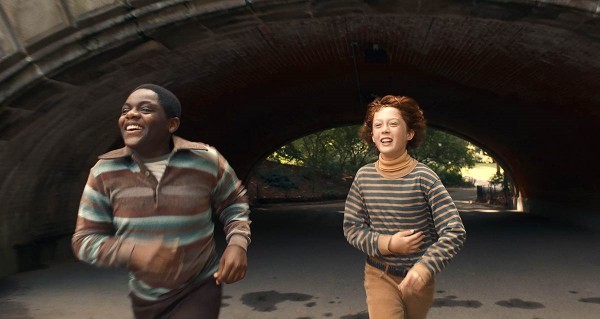
JAYLIN WEBB, BANKS REPETA IN ARMAGEDDON TIME
TRAILER
Profiles in cowardice
My title refers ironically to a special fact about this film and James Gray. His unique courage is in willingness to admit his shortcomings. Specifically, in his autobiographical Armageddon Time he shows how he fails his sixth grade best friend. The compensation, of a bitter sort, is that it's the society that's failing all of us. The best friend of wispy, artistic Jewish sixth grader Paul Graff (Banks Repeta) is Johnny Davis (Jaylin Webb), who is doing his sixth grade for the second time, and who is Black. It's 1980, the start of the Reagan presidency. Politics, race, morality, and family pressures bear down on young Paul. Those and economics have Johnny in their vice grip. Paul does betray Johnny. But apart from the fact that Paul's not strong enough or responsible enough to be culpable for this, where the movie is paradoxically exhilarating is that this is a filmmaker's story about his life that shows how far short he fell from being a mensch.
Whether things get better in that sphere later we don't know, but is he not a mensch now in being able to present himself thus unguardedly? "Making a memoir," Gray has said in a recent interview (Reelblend Podcast), "Is not an act of self-aggrandizement; it's not like an excuse to talk about how terrific you are. "He sees it as an opportunity to do a searching analysis of yourself and also of the world you live in, that you lived in then. And he has said, and he shows, that he took great pains to be as specific as possible in the details about everything, the schools, the family, even the chinaware on the family table, just like his own growing up.
With this specificity and honesty, Armageddon Time became thought-provoking for me too. It aroused memories of my own family growing up, of what school was like. I didn't have a Black best friend, my father never beat me or even yelled at me. I was encouraged, along with my sister, to be artistic. Not going to private school as Paul eventually does (which separates him from his friend) was a conscious choice of my parents. I remember how sympathetic my fifth grade teacher, Ms. Robinson, was, her appreciation of my sense of humor; then how nasty and harsh was the sixth grade one, Mr. Standish, who put a damper on everything for me and on top of that had almost-physical clashes with a bigger, older boy (who may have been held back like Johnny). Because, as reviews have said this is a "very Jewish" memoir, it also aroused memories of my first warm encounters with young Jews, mostly in college, but we were still just boys then. I remembered the kinship I felt at the time. Gray's world is both sympathetic and distant.
Johnny and Paul are both troublemakers. But, as a dramatic outlining of racial and social inequallity, Johnny is consistently the one who gets more of the blame. Mr. Turkeltaub, their Mr. Standish, brands Johnny as a troublemaker and a loser. But while everybody, including the boys at Paul's new private school and Paul's own family, looks on Blacks as a danger and a liability, Johnny isn't clearly doomed until the pair get in trouble with the law. Then, Irving (Jeremy Strong), Paul's intense plumber (or plumbing engineer) father, turns out to have points with the cop in charge for having done him a favor, and so he has "a leg up." As Jews seeking to better themselves, Paul's parents know the importance of this. Because his mother, Esther Graff (Anne Hathaway, excellent), a home economics teacher, is president of the PTA, Paul thinks, and tells Johnny, that she controls the school. He is utterly naďve, but surely he is lying when he tells Johnny that his family is "very rich." They are, however, miles more secure than Johnnie, who lives with his grandmother who has dementia, and is likely to be put into foster care at any minute. What's heartbreaking in Armageddon Time is how both boys cherish dreams, Paul of being a famous artist, Johnny, with his NASA souvenir tokens, of being a space engineer.
Gray is wonderfully precise about very much in this film, including the family dynamics, with the brother Ted (Ryan Sell) who beats up on Johnny and tells him to shut up (but perhaps protectively), the parents, the uncle and aunt, also schoolteachers (Marcia Haufrecht, Teddy Coluca), and the famous Grandpa (Anthony Hopkins), all talking at once at the dinner table. Those are moments that stick with you, and surprisingly, Anthony Hopkins, as an old Jew brought from Ukraine to Liverpool and from Liverpool to Ellis Island, is believable, or at least you don't have time to question it, and his many speeches stick and sing. There is enormous weight on Grandpa's shoulders because he not only must be the one who encourages Paul as an artist but also the one who explains where they came from, about antisemitism and about the Holocaust, and who sits by in his dying days while the boy sets off his model rocket and tells him to be a mensch, not to take it when they talk shit about Blacks (and at this point Grandpa gets to spout a lot of profanity, perhaps as a rite of passage for Paul, perhaps to make him more up to date). Grandpa makes it clear to Paul the game is rigged, and you have to do all you must go get around it. This is why it's he who pushes for Paul to be switched to his brother's school, to play the game.
Yes, all this and more, and in a way it's absolutely great, and in another way it's too much. There's a nagging feeling that as fine as Jaylin Webb and Banks Repeta are (and they are both terrific actors), they just don't look right to me for who they're supposed to be. James Gray is doing his best, and it's very good. He enters familiar movie territory with Paul's new, private, school based on Gray’s alma mater, the Kew-Forest School. But he gives us details special to him: Paul is almost immediately buttonholed by Fred Trump (John Diehl), Donald’s father, who was indeed on the real school’s board of trustees. And then Donald’s sister Maryanne Trump (in a choice performance by Jessica Chastain) visits the school to give a poisonously absurd little speech about the value of hard work and how, ostensibly, no one handed her anything for free.
It feels as if Gray is drawing heavily on Truffaut's 400 Blows for the relationship between Paul and Johnny, especially when they get in their big trouble with the law by stealing a computer from Paul's new school, just the way Antoine Doinel and his pal stole the big typewriter. This is okay - there's no harm in a homage to one of the greatest coming of age films - but it underlines a big difference. Truffaut is transmuting his early life into art. Gray is intent on anatomizing all the social, racial, ethnic, and economic elements that fed into his young life and seeing them in the light of the American Zeitgeist. In the way he seems to draw on the incident from The 400 Blows, which starkly underlines the racial divide the French film didn't have, Gray is also grasping for a strength of structure that Armageddon Time, for all its wealth of information and even of wisdom doesn't have.
Gray's movie leaves us with a whole lot of things to think about, but they work as separate elements, not as a film, a work of art unified in itself. There are many touching and emotional moments, but they don't combine overwhelmingly fill you with an unforgettable visual and emotional impression the way it happens when Antoine Doinel runs down to the sea and stares into the camera. But that's not bad. It's almost a Brechtian Alienation effect. Nothing warm and cuddly here, even when Anthony Hopkins is on screen. We're supposed to think. When Gray said the film was a critique of capitalism he may have been going a bit overboard - but it's in there.
Armageddon Time, 114 mins., premiered at Cannes May 2022. It has since been or is slated for 19 other total international festivals including Telluride, Deauville, Zurich, Athens, Hamburg, Mill Valley and New York. Limited US theatrical release began Oct. 28, 2022. Metacritic rating 74%.
Last edited by Chris Knipp; 11-15-2022 at 04:20 PM.
-
AFTERSUN (Charlotte Wells 2022)
CHARLOTTE WELLS: AFTERSUN (2022) - NYFF
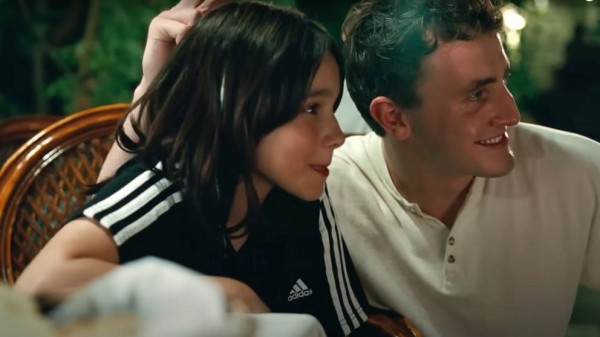
FRANKIE CORIO AND PAUL MESCAL IN AFTERSUN
An ephemeral, sad, and somewhat indigestible masterpiece
A.O. Scott of the New York Times writes in his review of Wells' debut feature that she is "very nearly reinventing the language of film." Yes, as all the critics say, this is a recreation of an eleven-year-old Scottish girl named Sophie's summer vacation with her young father twenty years earlier at a bargain Turkish seacoast resort, framed by brief images of the adult version of this girl, who glimpses video images they shot then. (The adult Sophie is Celia Rowlson-Hall; the much more lively and often-seen young Sophie is Frankie Corio. Her young dad, Calum, is Paul Mescal.) Yes, Mescal and Corio are fresh and amazing together. But the strongest impression Aftersun produces is its different, startlingly vivid, abrupt, staccato cinematic language (of most of the footage). Gregory Oke's close, intimate, angular camera is akin to Agnčs Godard's for Claire Denis, but AFtersun has its own way of visiting moments, then cutting away from them. Wells has her own way of telling a story.
AS Mike D'Angelo wrote in a private subscriber review that's positive, yet lukewarm, the film is "hyper-specific in detail but largely uneventful." He goes on to say Wells is "seeking to evoke rather than to dramatize," which is curiously imprecise - though "evoke" and "dramatize" don't do justice here. The effect is of vividly recalled instinctive memories, so close to the unconscious workings of the brain words like "story," "evoke," or "dramatize" are irrelevant. We can now quote the other half of A.O. Scott's sentence, "unlocking the medium’s often dormant potential to disclose inner worlds of consciousness and feeling."
At the same time, as we watch we subconsciously form in our mind a conventional movie about that familiar theme, a preteen's summer vacation, and scenes of a father and daughter. Thus we also have to come to terms with an idea expressed by Elena Lazic in Playlist: "Bold acrobatics in editing and ambitious creative choices," she says, "feel all the more superfluous next to Mescal's effortless charisma." One can understand how someone would say this. Corio and Mescal play wonderfully together, and they might easily impress in a flatter, more conventional film. But the style of the film and the performances are not at odds with - they enhance one another, producing a kind of double whammy.
Still, at first you may like me be fighting what you're seeing on screen. Editing styles are staccato these days, but Wells seems much of the time to refuse to follow through on anything. One may see this as memory's revisiting of sense impressions, with no need for logic or narrative connections. Aftersun, whose title refers to some skin product, threads through dozens and dozens of details, a sauna, a mud bath, a lonely karaoke singalong by the girl, her many interactions with other kids, scuba diving, pool playing (Sophie is good at pool, and she is a bold, adventurous girl, ready to plunge into adolescence) a swimming pool, drinks, dinners, a rug shop, the bedroom with one big and one tiny bed (because twin beds were not provided), and on and on and on and on, and lots of precisely remembered late-nineties ephemera, including multiple half-forgotten or dearly remembered pop songs (Justin Chang says Aftersun has "an unerring musical ear for its moment") for viewers for whom this was the most intense of remembered eras.
But this is quintessentially the kind of film one only puts together later. Its vividness almost chokes you and doesn't let you think. It glimpses Calum's unhappiness. (Some say Mescal isn't up to the subtlety required to convey this mysteriously though if so, why does everybody get it? However having him alone, from behind, in a long miserable wail, seems perhaps a tad obvious: not everything in this youthful, personal, "emotionally autobiographical" first film is perfect nor need it be.) It's only later, if the film works right for you, that the sadness, the "overwhelming emotional force" (as Justin Chang puts it) starts to sink in. See Jesse Hassenger in Paste Magazine: "In its gentle, modest way, Aftersun might well break your heart." Details are left mysterious, but a final sequence, one of a number of imaginary or imaginatively embroidered moments, is a shocker, telegraphing the finality, the awareness that this dad whom his young daughter didn't see very often, because she lived with her mother in Scotland and he lived in London, may never have been seen again. Probably the strongest emotion we take away from a movie is sadness, and that sadness at its best and most effective is a gathering of emotion that builds in the memory on the way home or hours later. AFtersun is a somewhat indigestible and also ephemeral little masterpiece, and one of the best and saddest films of the year.
Aftersun, 96 mins., debuted in International Critics' Week at Cannes May 21, 2022. It showed at many subsequent international festivals; 32 are listed on IMDb, including Edinburgh, Telluride, Toronto, and New York. US limited release from Oct. 21, 2022. Metacritic rating 95%.
-
DESCENDANT (Margaret Brown 2022)
MARGARET BROWN: DESCENDANT (2022)
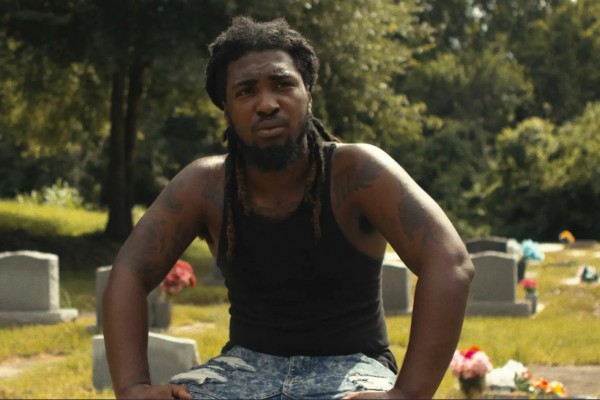
EMMETT LEWIS IN DESCENDANT
People and a place and the indelible scar of enslavement
The power and deep message of Descendant is all in the details, which are a gradual accumulation of moments whose collective import is much more than any one of them or any simple statement, any explanation. Early on Kern Jackson, of the University of South Alabama, says his preference is for messy data and messy history, not the neatly worked out and organized kind. This expresses the spirit of Descendant too, because here things, as suggested, gradually sift out, as if by themselves. We do our own thinking and above all out own feeling, through the people, whom we experience more powerfully thanks to the warm, present cinematography of Zac Manuel and Justin Zweifach.
Above all this is a film about place, about uncovering secrets, and about feeling roots. One senses it is a great film, though it's hard to say how and why it gains that status. You are advised to read the Rolling Stone review by K. Austin Collins, who best elucidates the film's original insight and formal invention. Collins starts with a jaw-dropping drone shot that doesn't come till midway in the film: he understands how Brown's remarkable process is one of discovery arrived at crab-wise, not of declaration - and that, though it arrives to catch us from behind, as Descendant becomes a documentary about a place it also becomes a study in environmental justice , and Collins co-reviews it with the Indian documentary about bad air and saving birds, Shaunak Sen’s All That Breathes. We discover now, at midpoint, that this little compound of tranquil greenery and empty spaces that is Africatown, thanks to lax zoning laws controlled like the local politics by descendants of enslavers, is surrounded with heavy-polluting industry and provided the descendants with a legacy of cancer.
Descendant is about the hidden in plain sight history of enslavement. But it's also about how places don't change. And what's good about that is it means people don't forget. The descendants of the people brought illegally from Benin/Dahomey in 1860 are still here, and so are the descendants of the people who brought them.
Doing that had been illegal since 1808 though owning enslaved people was still allowed in the US until 1865. This is a weird discovery for most of us, perhaps, in itself. The Clotilda cargo people from Dahomey therefore, after all the trauma and the loss of a culture, were only enslaved for five years. When they were released, they were sold some lousy land to have property of their own. The remnant of consolidation of that is Africatown. It was lousy then and it's lousy now, even lousier, a resident explains, with a highway running through where when he was growing up there was a quiet street with shops. Perhaps if it had prospered there would have been a massacre, like the Black Wall Street one in Tulsa in 1921.
But the place arrives to us by indirection. The focus here is oh the Clotilda and its history. Timothy Meaher, who apparently arranged the voyage of the Clotilda with Captain William Foster, had him burn the vessel to hide what had been done. The thread that runs through the pleasingly meandering line of Descendant is the search for the real underwater traces of this last slave ship, pursued particularly by an articulate diver and archaeologist, Kamau Sadiki, who is with the Smithsonian Slave Wrecks Project and an organizer and also an instructor of Diving With A Purpose (DWP), an international organization committed to resurrecting the stories of slave shipwrecks from the bottom of the sea through underwater archaeology documentation - and also teaching young Black kids to swim, as we see here.
The remnants of the Clotilda are found. This is an event that changes everything and changes nothing.
As we meet descendants of the Clotilda's original cargo, we learn they all know about this. The enslaved people were forbidden to speak of it, but the knowledge was variously passed down by oral transmission through the generations - knowledge dramatized in the film by readings by descendants from a book repressed, or shut away, for nearly a hundred years, Zora Neale Hurston’s Barracoon: The Story of the Last “Black Cargo.” She is a figure of African American history herself, who wrote the book from talking with t Cudjo Lewis, a last living survivor of the Clotilda journey.
We meet his young descendant Emmett Lewis, a sturdy, folky-spoken and incredibly charismatic young man with long dreadlocks who tells how an elder told him about the history as he lingered a lot in the burial ground with many of the community's tombstones and memories where he learned to listen to the ancestors.
The place is Africatown, known also as Plateau, just north of downtown Mobile, Alabama. The descendants of the people brought on the Clotilda are there, and nearby are the descendants of the criminal white men who connived to bring the prisoners from Dahomey, 110 of them, held for three weeks in the swamps before they were distributed to their three different "owners." We meet both, though we spend most of the time with the Black people, and also with others, Black and White, whose interest is in the history of this event and place.
This may after all be a film even more about people more than about place, but they seem inseparable. Director Margaret Brown follows various people around, whose vernacular eloquence impresses in various ways. One young woman, Jocelyn Davis, impresses with her alertness and openness. After the remnants of the Clotilda have been found and she has viewed a large realistic reconstruction of it a and wept, and we have wept with her, she says she doesn't know what is coming next, but she is excited and ready. Emmett Lewis goes to visit a restored plantation house of the slave owners, a beautiful place, and yet, as he says, evil, and that sequence also is one, of many, that made my toes curl, which is what happens when something is too deep for tears. What a crash course in all that the right wing wants to expunge from America's textbooks. An important film, and a cunningly made one in a great documentary tradition of finding and showing.
Descendant, 109 mins., debuted at Sundance Jan. 2022, showing also in festivals at SXSW, CPH DOX (Copenhagen), Boston, Birmingham, Camden, and in the Main Slate of the New York Film Festival. A Netflix film. Metacritic rating 87%.
Last edited by Chris Knipp; 09-06-2023 at 12:50 PM.
-
CORSAGE (Marie Kreutzer 2022)
MARIE KREUTZER: CORSAGE (2022)
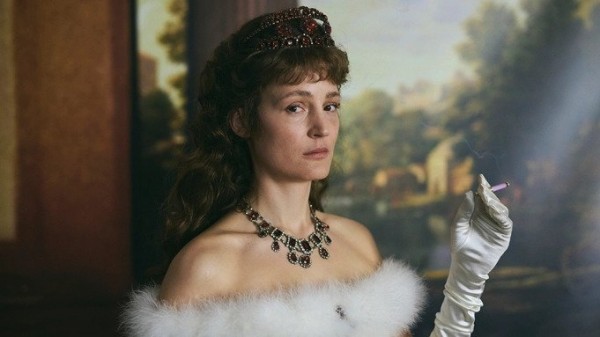
VICKY KRIEPS IN CORSAGE
A love-it-or-hate-it radicalized portrait of the Empress of Austria
Corsage, whose title refers to corsets not flowers, is a radicalized portrait - it is full of intentional anachronisms from language to dress to diegetic introductions of recent pop songs - of the empress of Austria-Hungary and is played, stunningly, by the actress Vicky Krieps. It's a mixed bag, beautiful, impressively staged, intentionally off-putting. It will be remembered, by some with distaste, by others with admiration. It has been a festival darling (opening in Un Certain Regard at Cannes), much awarded. If you pay close attention, whether or not you know the history it plays with rather freely, you're likely to come away confused. It's above all to b e watched for the full-bore mise-en-scčne and for a major performance by the chilly, striking Luxembourgish-German multilingual actress. She gets to speak German, French, English, and Hungarian, to strike a hundred poses and wear a hundred beautiful costumes. The film belongs to her. To say this character is a crazy prima donna is an understatement.
The time is Vienna in 1877, Elisabeth is becoming 40 at Christmas and it's a turning point. She's not the young royal star and influencer she has been since her fabled marriage-for-love with Emperor Franz Joseph (Florian Teichtmeister). Somebody points out women in the kingdom mostly die at this age. Interesting point: she's afraid of having children now and rules out sex with Franz Joseph: in one scene they start to make out and then masturbate together. But Elizabeth is massively energetic, as well as antsy and dissatisfied.
There is not much plot, or effort to give the film one by the filmmakers. Cutting off all her hair looms large. There is a rapid, almost whiplash-inducing succession of quick tableaux as the empress indulges a Spencer-like series of diet torments, riding exploits (including a fall that to her devastation leads to the death of her beloved horse), affair (flirtatious or outright sexual we don't know-Kreutzer is stingy with sensuous details) with her British riding instructor. Bay Middleton (Colin Morgan). The opening scene shows her holding her. breath under water in a tureen-like metal bath while maids time her . She also lingers in very hot water and she has a penchant for visiting insane asylums (it's hinted she feels kinship with the lunitics, and she lies down to smoke a long pink cigarette with an attractive young one). A new cure for madness is hot baths, and we see a whole row of tubs on one asylum visit.
It's impossible to list all the activities we see Elizabeth engaged, or indulged, in. She is most characdytreristically seen as a walk-out of state dinners or other affairs, a no-show at events; for her life, for her imperial responsabilities. Even as she is, we assume, still a rock star to her subjects, she turns away. Early on she says to her sister, her major confidante, "Let's go on a trip," when she has to be reminded Christmas is coming. She has children, a little girl and a grown-up boy. Both are disapproving of her antics: the little girl tells her she is the child. And this feels true. She is constantly wearing violet, passing out violet canies to inmates, smoking cigarettes with a flourish, being strapped into those titular corsets, never tight enough for her.
Corsage is very sure of itself. The enjoyable, hugely admiring Variety review of it by Jessica Kiang makes clear how its obstreperous defiance of norms (much like its subject's) defiantly, perhaps satisfyingly, sets it apart from the schmaltzy, popular celebrity portraits starring Romy Schneider and the new six-part Netflix series ("The Empress") that started this September. But this arbitrariness in flipping the historical rules it has followed so meticulously at times becomes unsteadying. One has to revel in the nutty ego games of the protagonist for their own sake to enjoy the film. But that is offset a bit, wouldn't you say, by the fact that this is a well-known historical figure at a much-documented time? This is a much more elaborate recreation of place and time than Larraín's Spencer, making its fantasy element harder to sink into.
One can praise the cinematography of Judith Kaufmann. Not so rue about the editing of Ulrike Kofler or the score of "Camille." Much else that's wonderful in the projection gets lost in the ego-shuffle. Even the Vienna Boys Choir is included. They sing as angelically as ever.
Corsage, 113 mins., debuted in Un Certain Regard at Cannes May 2022 (with the best performance award). It was included in dozens of other international festivals, including London, Toronto, and New York. Metacritic rating: 81%.
Last edited by Chris Knipp; 11-19-2022 at 03:51 PM.
-
A COUPLE (Frederick Wiseman 2022)
FREDERICK WISEMAN: A COUPLE (2022)
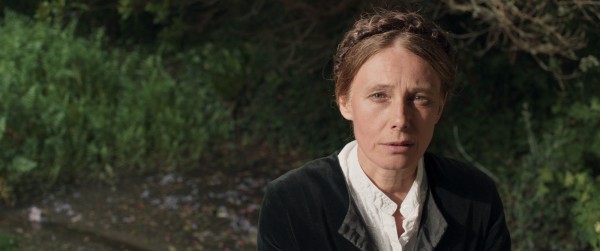
NATHALIE BOUTEFEU IN A COUPLE
A COUPLE (Frederick Wiseman) gets a 4/5 in Peter Bradshaw's Guardian review, which kindly summarized at Venice this fictionalized, dramatic feature film of only 64 minutes from the documentarian of normally epic length. Nathalie Boutefeu, also coauthor of the script, stars as the wife of Leo Tolstoy with "a series of yearning monologues" (as Bradshaw puts it) "which have been adapted from her diaries and letters." This is Wiseman's first narrative feature in 20 years. His last such, the 2002 film, was similar, from a Russian (or Yiddish-Ukrainian) source but spoken by a woman actress in French and an hour long. But it was a filming of his own Paris stage production of La derničre lettre. Both seem to reflect that though Wiseman is still listed on IMDb as a resident of Cambridge, Massachusetts, he resides in Paris. The new film was filmed in France, in French, in a privately owned seaside garden on the French island Belle-Île off the coast of Brittany.
A Couple is Tolstoy's wife Sophia Tolstaya speaking, and dramatizes excerpts from her journal. It is a kind of letter too, because it begins with actress Natalie Boutefou as Sophia, saying, "The first thing I feel like doing today is to write to you, Leo." She explains that they got into the habit of writing each other every day even though they lived in the same house. She goes on about how her husband, the great writer, crushed her with his power, oppressed her with his jealousy, embarrassed her in front of guests. How hard she worked, copying and recopying his manuscripts (she reportedly wrote out all of War and Peace two or three times).
The monologue addressed to Leo continues, with things he said in his diary, and more about their repressed, intense, frustrating relationship which demanded so much of her and gave so little back. More too about his neurotic fear of death. Then there are more general statements: "Even the most sincere and honest of us always wears a mask and hides what we are deep inside. . .Most people live as if they are blind. . .Life shrinks and dwindles." But she is still talking about Tolstoy. His being a creative giant made him a shrunken man, a twisted husband with not much left to give - who yet at times spoke of great love.
She describes a suicidal moment when she entered their freezing bath house and dreamed of getting sick and dying, leaving Leo to take care of the children in her place. She speaks of his infidelity, and how it changed their feelings toward each other, but then they make up and things are good for a long time.
This review of a marriage is intense, painful, partly beautiful, emotional, but also somehow abstract. One might like to hear from Leo - though she often quotes him here - speaking about this relationship for himself; but of course that also would not work because as she says at the outset, his power smothered and dominated him, and the need is for her to break free, even if she does so only to talk about nothing but him.
Nathalie Boutefeu is plain, but elegant. Wearing braided hair, she is dressed severely but handsomely in a white blouse and black velvet, sometimes a flowered shawl with a black field. There is a coolness but also a sweetness about her, restraint but also a smile in the eyes. She speaks softly and quietly. All her monologue is outdoors. Sometimes she sits or stands, sometimes she is is walking, by rocks, tide pools, bushes and grass. There are memorable closeups of termites swarming on a log and big ants, and beautiful blooming flowers. Breaks in the monologue are filled by acres of green, bramble or trees or great rocks, with crashing sea at the start.
It would not be an exaggeration to say this is a beautiful film, but its recollection-in-sadness mood isn' terribly moving. Bradshaw introduces this - rather badly titled - film as "a belletristic homage to the most famously unhappy marriage in literary history." He points out the setting is pure invention; the Tolstoy estate, Yasnaya Polnaya, was nowhere near the water. The situation is of a kind of sweet imprisonment, one might say. Not mentioned is the sweet trap of being married to one of the greatest writers in history, the reflected glory, despite the sometime psychological mistreatment. Because Tolstoy "at least sometimes" loved Sophia she was "doomed to bear the burden," Bradshaw puts it, "of looking after the house and grounds" (though surely there were caretakers to tend to the details of that), "seeing to their many children" (and while she seems to mention only two here, there were thirteen!), as well as "dealing with Tolstoy’s many guests and insufferable fan-worshipping admirers and acolytes, and of course, helping him with his work." But except for the caretaking and children and help with the work, Bradshaw is filling in details not specified here. As said, this is a film that's beautiful, sad, a little abstract. One sees the inexhaustible, now ninety-two-year-old Wiseman straining a bit to bring something to life when he is, at heart, the cool, meticulous observer - and that's a very different thing. Marshall Schaffer pointed out in Playlist that A Couple "never quite manages to transcend its origins as a precious pandemic project." No matter how beautiful it is, it remains static.
A Couple/Un couple, 64 mins., debuted at Venice Sept. 2, 2022, also showing at DMZ (South Korea) Sept. 25 and the NYFF Oct. 2. It opens Oct. 19 in France, and In the US released by Wiseman's signature Zipporah Films at Film Forum Nov.11. Metacritic rating 73.

NATHALIE BOUTEFEU IN A COUPLE
-
SHE SAID ( Maria Schrader 20220
MARIA SCHRADER: SHE SAID (2022)

CAREY MULLIGAN AND ZOE KAZAN IN SHE SAID
'Times' Harvey Weinstein investigation story feels flat
A two-woman reportorial team at The New York Times broke the October 2017 story about film producer and distributor Harvey Weinstein's three-decade history of sexual harassment and rape. Weinstein, head of Miramax and his own company, became gthe most notorious example of the abuse of women, particularly in Hollywood, which spearheaded the #MeToo movement that has altered the balance of power of the sexes. She Said is a journalistic procedural film in the manner of All the President's Men or Spotlight.. It is an essential story. Unfortunately, it winds up being a more dutiful and less exciting watch by a fair margin than those other films. As the Austin Chronicle review put it, She Said" is a respectful, serious-minded effort that works so hard not to sensationalize the material, it works against its dramatic impact."
This isn't the fault of the core cast of Carey Mulligan as the tough, elegant senior reporter Megan Twohey, Zoe Kazan as her eager, weepy ingenue partner Jodi Kantor, Patricia Clarkson as their suave senior supervisor Rebecca Corbett, or Andre Braugher as Dean Bequet, their forceful, confident boss. Their performances are fine. So are those of the numerous other actors playing secondary roles, especially the key ones of women abused by Weinstein, including one, Ashley Judd, who briefly plays herself.
The story's importance is hard to overstate. Not only was Weinstein a notorius, outrageous case, a flagrant, serial abuser, but he was a really important figure in the world of movies. Some of Mr. Weinstein’s films include Sex, Lies, and Videotape, Pulp Fiction (as well as other Tarantino films) and Good Will Hunting - and many of the notable films of the past thrity years; Forbes lists 81 Oscars his films won. She Said has been praised for not showing Weinsein doing his ugly business, though his modus operandi is frequently described. He had young female assistants. They were often thrilled to have this job, because they wanted a career in the film industry, and it put them close to one of the most famous and powerful figures in movies. It has since emerged, by the way, that Weinstein was as crude, crass, and manipulative in his handling of a lot of the films he distributed, especially Asian ones, as he was with his human victims, ruthlessly cutting and rearranging them sometimes so that they would be more mainstream or sell more tickets, in his belief. One should add that he was a big, physically imposing, ugly man. Sometimes one wishes this movie provided a more vivid sense of his physical presence, his bullying menace.
Weinstein routinely had these young women working for him report to posh hotel rooms he was staying in in New York or abroad. He would come to greet them wearing a bathrobe, force them to sit near him, appear semi-nude or naked, ask them to watch him shower, and persuade them to massage him and otherwise be intimate with him. This sometimes led to forced sexual intercourse. If the young woman fought, protested, or fled in tears, as they often did, he would threaten them to keep them quiet. He or his company paid millions, we learn to buy their silence, having them sign binding agreements never to speak of their experiences even to family members. When they fled from him, these young women were blocked from getting other work, left traumatized and robbed of their career hopes. The damage done was incalculable. Moreover, though this is only mentioned, it's reported that such behavior in some form or other was commonplace in the American movie industry. It's not over, and we can only guess to what extent the exposures and #MeToo have improved male behavior in the film industry and beyond.
Most of the time of She Said is spent following Megan and Jodi, who are shown to be mothers with husbands and children, as they go on numerous trips and make countless phone calls and interviews and known on doors to ferret out who Weinstein's victims were and contacting them and trying to persuade them to speak on the record. They also importantly deal with Weinstein's lawyer and accountant and persuade them to bend. The signature moments are ones in which Megan and Jodi slowly gain confidence, or the happy time when a witness changes her mind and promises to go on record. Endless effort, ultimately tiresome, is spent seeking to find out how many verifiable silence agreements Weinstein there had been and how much was paid out.
The story the Times published is long and detailed. If you read it you understand why the lengthy period of investigation depicted in the movie was necessary. If the movie drags, despite the significance of the subject matter, the causes are twofold. This story is a shocking and imortant one but it's not as complex as Watergate or sexual abuse among Catholic priests, but instead focuses on the repetitious behavior of a single man. One might contrast François Ozon's 2018 By the Grace of God/Grace ŕ Dieu. By successively entering into the experiences of three very different men who all suffered sexual abuse by priests as boys, the film gives us a sense of exploring a whole range of society. Spotlight follows the work of multiple Boston Globe reporters discovering the abuse of multiple priests.
The other issue with She Said is simply the screenplay and the direction, which are equally flat and uninspired. (See Keith Watson's Slant review.). They make the action seem more repetitious than exciting. She Said winds up feeling dutiful. German director Maria Schrader's 2021 satirical sci-fi movie I'm Your Man was witty, thought-provoking, and enjoyable. She may have been rather out of her element here.
She Said, 129 mins., premiered Oct. 13, 2022 at the New York Film Festival, showing at 19 other mostly US and some international festivals listed on IMDb. Metacritic rating 73%. US release in theaters from Nov. 18, 2022.
Last edited by Chris Knipp; 11-24-2022 at 09:36 AM.
-
BONES AND ALL (Luca Guadagnino 2022)
LUCA GUADAGNINO: BONES AND ALL (2022)
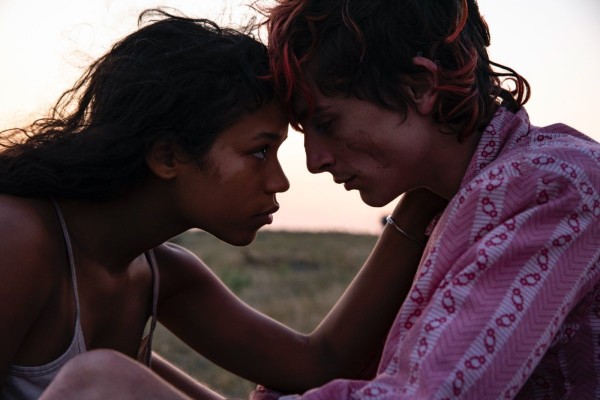
TAYLOR RUSSELL AND TIMOTHÉE CHALAMET IN BONES AND ALL
Almost enchanted, one still asks "Why?"
Luca Guadagnino's new film Bones and All is dangerous to describe because if it succeeds at all it's unclassifiable. The director here films a kind of teen romance road picture, featuring a girl, Maren (Taylor Russell) and a boy, Lee (Timothée Chalamet), who are cannibals. Fine young ones? I don't know. There is a big part of them that wants to be just people, though that of course is impossible. Their dilemma encourages us to identify or at least sympathize with them. Their world is in flux. They don't know who they are or where they're going from one minute to the next. The best aspect of this often disturbing and distasteful film is an authentic sense of danger and unpredictability, the excitement of youth at risk. If Guadagnino can keep the action on the screen feeling strange and unpredictable, it may feel real.
That said, it's disappointing that a major monkey wrench in the well oiled romance is the appearance before Maren and Lee even meet, but after Maren's father (André Holland) has skipped out on her leaving her, age eighteen now, to fend for herself, of Mark Rylance in full-bore character mode as folksy (but creepy) older cannibal Sully. Sully is explanatory. He informs the newly-on-her-own Maren they refer to themselves as "eaters," that the need will only grow as she ages; they can go for long periods without, but they will always need to dine again. He also points out that they can smell each other. Consuming a whole human "bones and all" is a special treat. He has his own rules. He does not kill, or he says not. Eaters do not eat eaters, or at least by his rules they don't.
Rylance is a great actor and delivering such conversation in cornpone tones must have been a pleasure for him, but it distances us, whereas Maren and Lee have their own specificity and, yes, humanness.
For followers of Guadagnino there are points of contact to begin with. Timothée Chalamet was the linchpin of the director's most appealing and successful film, Call Me by Your Name. There are a few brief but memorable moments involving Chloe Sevigny, as Maren's mother, whom she has never known, and now tracks down: Sevigny figures prominently in the director's engaging, enveloping one-season HBO series, "We Are Who We Are." It also seems as if Taylor Russell is akin somehow to Jordan Kristine Seamón as Caitlin in "We Are Who We Are," who enters into a sort-of-but-not teen romance in the series. Guadagninino again shows a penchant for teen experience, this time not misfit schoolkids, but a sort-of Bonnie and Clyde.
It might be tempting to say cannibalism is just incidental in Bones and All, or a stand-in for something else - being a misfit, addict, foreigner, gay - except for the considerable amount of gore we see in this film. In making the compulsive, bloody lust to consume human flesh and blood intense and vivid, the film stands with the best of them. It makes the ugly act more real. This in spite of the fact that, as David Rooney puts it in his Hollywood Reporter review, Guadagnino is "far less interested in the shock factor" than in "the poignant isolation of his young principal characters and the life raft they come to represent to one another..." That doesn't mean the shock factor isn't there. But our identification with the "poignant isolation," condemned to live wrong as dangerous, forbidden enfants maudits, a tragic and romantic situation we're rudely awakened from when a new scene of gore bursts with shock onto the screen. "Twilight" is one of the many implied references, but these rootless cannibals seem sadder than suburban middle class vampires whose pallor so much becomes them.
Taylor Russell is a new face and it's hard to define her or her character except to say she fits so seamlessly we accept her. The device is used of a cassette tape her father leaves her that plays through half the movie, where he describes their life together, how he protected her (running from one identity and location to the next like the revolutionary fugitive family in Lumeet's Running on Empty), but can't do it anymore.
Lee, Chalamet's character, comes with something of a family life, including a sister who reproaches him for too often being away. Chalamet is, to his advantage, deglamorized here. True, when the falling sunlight is at a good angle, his reddened hair is fluffed and his profile is turned the right way and the Trent Reznor and Atticus Ross score soars, he's a perfect gutter pretty boy. But dp Arseni Khachaturan's camera isn't always friendly to him, shows wrinkles and strain, his mouth is twisted, and Chalamet becomes the most interesting character he's ever played.
Many would agree with what A.O. Scott says in his New York Times review, that Bones and All is "a ragged hybrid of genres and styles, an elevated exploitation movie, a succession of moods." You might say that's always true when horror or genre are done well. The difference from some examples, like, say, Near Dark, is it all seems less a lark, and nothing is a laughing matter here.
Guadagnino takes himself very seriously, which may seem a bit much. But after being softened up by thoroughly loving Call Me by Your Name like almost everybody else, I became a fan binge-watching and binge-repeating the eight very rich hours of "We Are Who We Are." Those hours have showed how satisfyingly detailed and empathic this filmmaker's sense of a world can be and how much he cares. That explains how seriously he takes these young cannibals, and I thank him for that. I also became aware of his use of music. Music is so important in "We Are Who We Are" the whole final episode is devoted to Fraser and Caitlin's attending a concert by the composer of the series' score, Dev Hynes, aka Blood Orange. There are several splendid musical moments this time too, and the Reznor/Ross score is powerful without ever seeming to intrude.
It's also worth commenting how somehow it appears this movie effectively manages to use the environs of Cincinnati to create the feel of eight or ten different states, a brilliant stay-at-home road picture effect, with memorable seedy interiors by Khachaturan and the set dressers throughout. Guadagnino is fascinated with trailer park Americans - a tradition, like the trailer park RV vampire killers in Kathryn Bigelow's 1987 B picture classic Near Dark, which has been billed as a Western.
I still can't help asking: Why? But I think the answer is there somewhere. I ask that more pointedly for Claire Denis' Trouble Every Day, because this is a better movie, its principal characters easier to almost-like.
Bones and All, 130 minutes, debuted September 2, 2022 at Venice. It was shown also at Telluride, Zurich, Austin, Bergen, Vienna, Brisbane, Săo Paulo, Leiden, Taipei, Stockholm, and other international festivals. It was presented in the Spotlights section of the NYFF. Metacritic rating: 72%. Limited US theatrical release Nov. 18, 2022.
_________________________________
"Bones and All is a ragged hybrid of genres and styles, an elevated exploitation movie, a succession of moods — anxious, horny, dreamy, sad — in search of a metaphor. Or maybe the metaphor is obvious. Neither raw nor fully cooked, it might make you lose your appetite, but it’s more likely that you’ll still be hungry when it’s over." - A.O. Scott.
Last edited by Chris Knipp; 11-24-2022 at 02:48 AM.
-
THE NOVELIST'S FILM 소설가의 영화, (Hong Sang-soo 2022)
HONG SANG-SOO: THE NOVELIST'S FILM 2022)
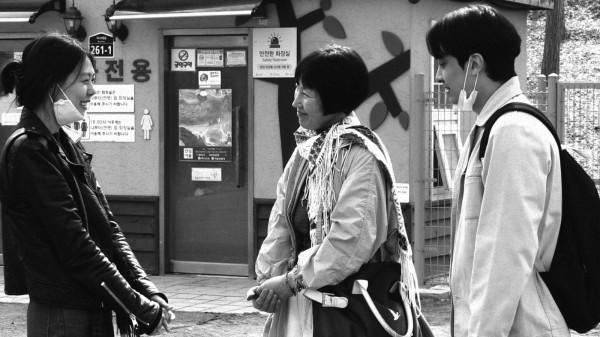
KIM MIN-HEE, LEE HYE-YOUNG, AND HA SEONG-GUK IN THE NOVELIST'S FILM
Turning to another medium in a dry spell
In this latest variation on his themes of revolving encounters, drinking and talking and self-reflective examinations of the creative life and the vagaries of relations between the sexes, Hong Sang-soo introduces Junhee (Lee Hyeyoung), a well known and once prolific woman novelist who has become unable to write. We find her arrived on a trip away from Seoul to a small town to visit a woman friend (Seo Young-hwa) who, unbeknownst to many, according to her, is now running a bookstore (also a cafe and local gathering place). She is herself a writer whose well seems to have run dry; in fact that seems to be why Junhee has come to seek her out. Here the novelist also encounters Gyeongwoo (Ha Seong-guk), a young film student who knows and admires her very much. She also, at a modern lookout tower, meets Hyojin (Kwon Haehyo), a director she seems not to think much of, who it turns out had intended to adapt one of her novels, till the project was squelched due to lack of funding. She is unimpressed.
After several chance meetings, Junhee winds up lunching with Kilsoo (Hong's muse and partner Kim Minhee), a well-known actress who claims to be fed up with the thespian life. Junhee has not met Kilsoo before but loves and admires her work, as Kilsoo loves and admires Juhhee's.
So it is that sitting there Junhee gets the idea of trying her hand at cinema, for the first time making a short film that she proposes will star Kilsoo, with the aid of Gyeongwoo, an idea to which Kilsoo somewhat tentatively agrees. It won’t be like other films. It will be the novelist’s film. Ir at least so runs the festival blurb: novelists have been known to dive into movie-making, but the idea may be new in Hong's world.
The action here, not for the first time in this director, is meandering and sociable. It involves people meeting old friends, or persons they have long admired, and finding ways to spend time with them in different groupings that fill up the whole day. Sociability that might seem more time-wasting for artistic people in dry spells, is seen here as necessary and restorative and leading to ideas. There is also a warm plug for the joys of reading, but only what one really likes. At a group drinking scene at the bookstore after Junhee has made friends with Kilsoo over a ramen lunch, the novelist finds herself next to a bewhiskered older poet, Mansoo (Gi Joo-bong), whom she used to drink with, too much, she thinks now, but he totally disagrees. (There is some cultural discomfort in hearing the way drinking is mindlessly extolled as a good in itself in Hong's films.) Everybody should drink a lot sometimes, says the washed up poet. Kilsoo drinks so much she falls asleep.
It appears the only character who is clearly not going through a creative dry period is the film student, Gyeongwoo - and maybe the bookseller's assistant, a shy young adept at sign language (Park Miso). Gyeongwoo however is a useful mechanism rather than one of the interesting, sympathized-with characters. There is a plethora of characters this time, but in exchange the chronology is more linear than usual except for a leap forward at the end with an excerpt from the completed short film.
Great admirers of Hong tend to like nearly everything he does and the New York Film Festival twice in a row has included two new Hong films in their annual Main Slate. But in this film the thrill is not as much there as in Hong at his best. Nonetheless the central idea is nice: a whole gathering of artistic types out of ideas or suffering creative blocks happens partly deliberately and partly by chance one day, with the result that two of them collaborate together with the essential help of a young man with a camera to make a short film, starring the actress, written and directed by the novelist.
This interesting but less that top-tier effort is marred by a repetitiousness in the dialogue in the way characters in various combinations fawn on each other, alternately gushing vague and sweeping compliments or giddily giving thanks for them. Could there not have been at least one character who is sarcastic or niggling with praise? Or are there bat squeaks of disapproval or jealousy lost in the subtitles?
One returns to a favorite idea expressed by the celebrated American abstract expressionist Robert Motherwell, that an artist's less successful works are necessary stepping stones to the good ones.
The Novelist's Film 소설가의 영화, debuted at the Berlinale Feb. 15, 2022, winning the second-place Silver Bear Grand Jury Prize, also showing in over two dozen other international festivals, including Taipei, Toronto, Busan and New York. French title: La Romancičre, le film et le heureux hasard. Metacritic rating: 82%.
Last edited by Chris Knipp; 11-28-2022 at 11:34 PM.
-
STARS AT NOON (Claire Denis 2022)
CLAIRE DENIS: STARS AT NOON (2022)

JOE ALWYN, MARGARET QUALLEY IN STARS AT NOON
Two Anglos in lust and in danger in central America
Issuing a second film in one year, Claire Denis has made a movie in English, with quite a bit of Spanish, appropriately enough since it's set in an updated version of of the uneasy, dangerous Nicaragua of the 1980's in the eponymous Denis Johnson novel. The updating seems to have drained much of the political logic from the story, adding real-life scenes related to the COVID pandemic in a steamy, rain-drenched Panama where this was shot starring Margaret Qualley and Joe Alwyn as two drifters turning into fugitive, alcoholic lovers, and Benny Safdie, who interprets a CIA agent as a kind of insidious buffoon.
Under the circumstances, though at Cannes, where this was Denis' only second time being selected afteer her debut Chocolat it did win the Grand Prix, many Anglophone critics have panned the film (Metascore 64) because the erotic political thriller is mostly not really there, only the erotic part and the sense of danger and malaise without much interest in a plot. But they're missing out how wonderful the atmosphere is, the sense of hopelessness and danger two unexpected lovers seek to escape from with drink and sex. Only Denis could do this with such sensuous ooze. I liked the spiky, nutty go-for-broke performance of Qualley and was taken by the classy, glamorous English blond good looks of Alwyn, whom I'd liked in another movie the critics liked even less, Ang Lee's Billy Lynn's Long Halftime Walk (NYFF 2016). Alwyn has so much glamour and sexiness he does't have to do much. Robert Pattinson was the first choice and he would have made the character more appealing: but is that desirable? It's essential that this man is somewhat dicey and out of reach.
Denis seems to be thinking of a country that's being taken over by a dictatorial regime like the one in her White Material (NYFF 2009): elections are being postponed for the second time, and armed guards of several different kinds are everywhere. Costa Rican heavies have also infiltrated. Trish (Qualley) knows more about these and also is fairly fluent in Spanish, which Daniel (Alwyn) doesn't and isn't, so she has more insider knowledge than he, when they come together. But she has been discredited and worn out her welcome by doing articles about bribery and kidnapping in the country. She Skypes a magazine editor (John C. Riley in another misjudged, tonally jarring American cameo) begging for work and he tells her she's no journalist and to fuck off. Qualley's skinniness and extreme youthfulness make it easy to accept that her journalistic knowhow hasn't gone very far despite her knowing her way around.
Trish is living a desperate, wild life, sleeping with men for $50, cash, US, regularly with a subteniente (Nick Romano) and a Vice Minister of Tourism (Stephan Proańo), and she meets Daniel, who claims to work for an energy company, in the bar of the posh hotel he's staying in, the kind of place where she steals shampoo and toilet paper to take back to her sleazy dive room. He wants to see her again and she likes him much better than her regulars, as well she might: she notes his skin is "so white it’s like fucking a cloud" (you had to be there). Before that she has seen him with a slick looking guy (Danny Ramirez) he claims is something legitimate and she warns him is a Costa Rican cop. Does he really not know he's in danger?
What counts here is the rain, the hotel rooms, the sense of being, as Trish now is, both an insider-foreigner and persona non grata, with too many córdobas and never enough American dollars, no phone and her passport in the hands of the subteniente . Both now feel a desperate need to escape the country while the means to do so are slipping ever further out of reach. Daniel and Trish are drawn to each other, she is a lush and he drinks along with her, though going more for beer while she's guzzling rum, the sex is good and the danger seems to turn them on. The signal image is of a taxi driver Daniel has given his burned cell phone to murdered at the wheel of his cab with the phone in his mouth. The ending is chilly and ironic. I was reminded of Robert Stone. If this is one of Claire Denis' bad movies, it may be the one I like best.
Stars at Noon, 135 mins., debuted in Competition at Cannes in May 2022 winning the Grand Prix, showing also at Sydney, Melbourne, Deauville, New York and Vienna. US limited release Oct. 14, 2022. In theaters and available to rent or buy on Apple TV, Google Play and other streaming platforms and pay TV operators. Opening in France in May 2023, where they will probably dig the sensuality more. Metacritic rating: 64%.
-
THE INSPECTION (Elegance Bratton 2022)
ELEGANCE BRATTON: THE INSPECTION (2022)
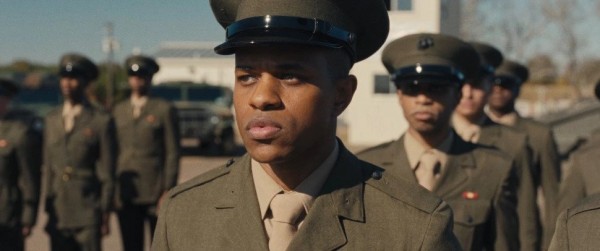
JEREMY POPE IN THE INSPECTION
A Black gay man goes through Marine boot camp successfully but doesn't gain mother's acceptance
Elegance Bratton has declared his A24-released feature film debut to be autobiographical. He like Ellis French (Jeremy Pope, himself a queer Black actor) in The Inspection, is a gay Black man who joined the Marine Corps following ten years living on the streets in Trenton, New Jersey after his mother kicked him out at 16 for being gay. The tormented, still loving mother-son relationship is as central to this movie as the boot camp experience that fills most of the run time; shortly after graduation from the camp. the film ends, but not before a highly fraught meeting between mother and son. However rough in spots, this movie is vivid, intense, and felt.
Marine boot camp paradoxically treats recruits as non-beings and the training platoon Ellis is in is presided over by an aggressive Black training officer, Sgt. Laws (Bokeem Woodbine), who says he hates recruits and seeks to break them down, but when they're turned into Marines they become precious. Reluctantly, or with much hesitation, the very Christian but clearly tormented Inez (a powerful Gabrielle Union) attends her son's Marine graduation. The Marines, after a struggle, despite discovering that he is gay during this "Don't ask, don't tell" period (1994-2011) have somehow made Ellis one of their own, and once you're a Marine, you're golden. But when Ellis has to explain to the hopeful, delusional Inez who envisions his having a string of girlfriends now, "Mom, boot camp didn't make me straight," she withdraws her invitation to come back and stay with him for his month before reporting for service, and they are back where they started. Maybe the dedication to Bratton's mother at the end of the film, along with the information that Bratton indeed served in the Marines from 2005 to 2010, indicates some kind of truce between mother and son came about before her passing; alas, he says not.
The Inspection is a strong movie but despite its autobiographical origins, doesn't always seem real. Maybe it doesn't matter: it has an emotional reality. Screen versions of military boot camps tend to seem like mechanical ritual or absurd fantasy. Moreover, Ellis' personal gay sexual fantasies of the other men in boot camp are tormenting and as important perhaps, as his daytime challenges. (See Benjamin Lee of the Guardian for the review with a fuller queer perspective on this film.)
Bratton's need to work through his own experience of boot camp and his mother's rejection sometimes seems stronger than his desire to tell a story. Starting to write the screenplay in film school his memories of five years in the Marines may have been pushed out sometimes by movies. The representation of Sgt. Laws tends to be overwhelmed a bit in our minds and perhaps Bratton's by Kubrick's Full Metal Jacket and its classic boot camp sergeant Hartman played by R. Lee Ermey, who, under Kubrick's master hand, seems too good to be true, though Ermey was a ten-year Marine veteran as wall as an actor. Sgt. Laws isn't as enjoyably absurd, but his excessiveness, up close as seen here, is very theatrical. Ellis is also tormented by the chosen recruit squad leader (McCaul Lombardi), up close all the time too, who tries to get him disqualified but fails. (An Officer and a Gentleman is another classic training movie that will come to mind, and probably eclipse, this one.)
There are new wrinkles, like Muslim recruit Ismail (Eman Esfandi), who is forced to attend a Christian service conducted by a caricatural Southern chaplain (Wynn Reichert) with non-believing Ellis, and rushes out and is comforted by Ellis weeping in the latrine because he has realized the Marines will just equate him with the killers of their comrades in Desert Storm or Iraq. Sgt. Laws shows the recruits a video of Sam Mendes' Jarhead (which would have been new then), saying it perfectly shows their experience in Desert Storm. Well, that would not be a Marine recruitment film, and neither would this. It may be true, truth is stranger than fiction, but it also seems a bit implausible that Ellis would be spotted as gay because he gets an erection in the shower naked with other recruits. Tough luck if so, since showers are obligatory and collective activities. It's Bratton's skewed impression of the straightness of his fellow recruits that mail brings a bible with girlie photos crammed into it and that night they are all busily masturbating.
In the physical part of boot camp, the sit-ups and pushups and runs and obstacle courses, despite every effort to throw him off Ellis does fine. His relations with the other recruits are uneasy after the shower revelation. He performs at least adequately, perhaps well, in the crucial final rifle marksmanship test but his enemies try to falsify his failure. This is where it's clear he has some advocates, including an instructor (Raúl Castillo) who has confided in him, another person Ellis comforts, though when he interprets kindness as an opening to physical intimacy, he gets in trouble.
Having gone through Basic Training in the Army in earlier days, it was surprising to me how much these recent Marine recruits talk to the sergeants, always shouting out and prefacing all remarks with, "Sir, this recruit..," speaking of themselves in the third person. The progress of boot camp doesn't come through as a fixed set of training goals so much as a series of vivid memories, like eating with violent appetite (which I also remember; food never tasted so good and there was never enough of it). Sometimes the personal interactions feel contrived, heightened or condensed from real experience. But each test passed is a validation, and while the friendliness of the other recruits seems a bit sudden, Ellis' sense of accomplishment is something the viewer shares. Jeremy Pope has a jutting jaw and mouth, and his own special way of smiling that morphs back and forth into a frown. If the process sometimes seems contrived, his transformation seems real, the sense of identity in desperation achieved.
The Inspection 95 mins., debuted at Toronto Sept. 8, 2022 then New York Oct. 14, showing in a dozen other festivals, mostly domestic, but including London BFI. Limited US theatrical release from Nov. 18, 2022. Metacritic rating: 73%.
 Posting Permissions
Posting Permissions
- You may not post new threads
- You may not post replies
- You may not post attachments
- You may not edit your posts
-
Forum Rules






 Reply With Quote
Reply With Quote
















Bookmarks